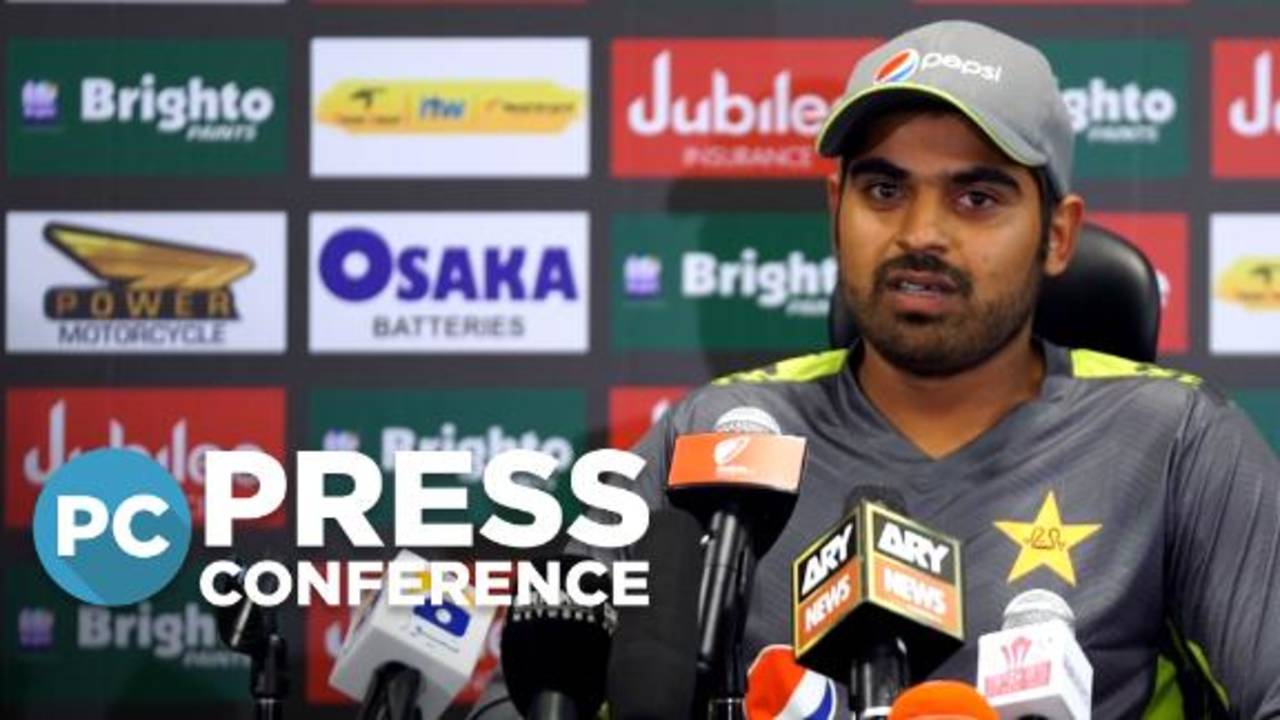Sometimes it's the 30s and 40s that end up mattering, more than some easy fifties and even hundreds. Ordinarily and just off a scorecard,
Haris Sohail's scores this summer in Pakistan's three Tests in Ireland and England - 31, 7, 39, 39*, 28 and 8 - read like an impeccable requiem to batting frustration. Getting starts, getting set and ultimately getting nowhere. It's not true.
What Haris was doing, especially for example during that 31
in Malahide and the first innings 39
at Lord's, was learning how to bat at this level. The Lord's innings in particular was about as rewarding a 39 a young batsman can score in his career. The ball was darting about, off the surface and in the air throughout, and he was facing, for those conditions, two of this planet's finest bowlers.
The enduring image from it is of him playing, missing, turning back, putting his head down, the ball perhaps out of his head, facing up again and doing it all over again. And again, and again. Occasionally he struck the sweetest shots; in one Jimmy Anderson over on the second morning, he first drove a boundary through the covers in the approved manner of sexy left-handedness, on one knee; and then he bunted one straight down the ground, both as clean as soap. He then got struck on the ribs in anger and ended the over beaten twice by monster Anderson balls.
If he was so inclined there was more learning to glean from that one over than some entire innings he would have played. Through the innings he worked out ways to score runs, to pull bowlers into bowling to him; he worked out a way to sustain a partnership and was, ultimately, a significant little part of a big win.
At Headingley, he would start poorly before settling and then throwing his wicket away.
As it turns out, all of that went into what came out today, in the form of a maiden Test hundred. Now to be honest, this was a bit of a grind, especially if you contrast it with the elegant sprightliness of his
very first Test innings last year.
This one contained long periods nobody will remember, and not just because there was nobody in the stadium to do the remembering. These periods were occasionally punctuated by reminders of his heightened sense of timing - a skip down the track to the spinner, a shimmering drive through extra. There was one late-afternoon push down the ground which was so deceptively well-timed, it looked for most of its existence as if it would fetch, at most, a risky single.
But overall it was the kind of innings that allows people's minds to drift away from it, because it is unhurried even as it was mostly untroubled. The kind where people get bored and instead get worked up about the pitch being a road or some such instead, and only desultorily acknowledge the innings because of the wholeness a three-figure landmark provides it. If you argued that his 39 was the better innings, no jaws would drop.
It was also, as some of his more notable work has always been, an intelligent innings. Assess the conditions, the opponents in front of you, and work around that. When the ball got old and lost its seam, he figured out that run-scoring might become difficult. The outfield was heavy too, so even though he was timing some strokes well, he was getting little reward. So he stopped, because what England taught him was not to panic when things weren't going to plan. He just waited until the new ball when he knew the runs would come.
"I got out in the 30s [in England], sometimes I got a good ball, a couple of times I panicked and threw my wicket away," he said. "Here I was consciously trying to move out of that situation where you can panic.
"That was the one thing in my mind throughout this innings, that I need not panic. The time to score runs will come and I just need to cash in then, so when I got out of those panic situations, the runs started flowing."
It was almost exactly a year ago that he was making his Test debut, down the highway in Abu Dhabi. He had
nearly lost his career in getting to that point and his 76 felt cathartic. It also worked as a retort. You'll remember the circumstances around it, when he was the guy who wasn't the
guy who should've been.
When Haris turned up at the press conference that day he was a little nervous, plenty relieved, and somewhat defensive, as if still not believing that his traumas were completely behind him, or that there wouldn't be brickbats in the imminent future because he wasn't
Fawad Alam.
Naturally, Haris was a much lighter presence today (apropos nothing, it was Fawad's birthday today), enough to joke about being a shareef (decent, polite) guy who ignored some mild Aussie chirping, letting it go in one ear and out the other, or that one benefit of the stadium being so empty was that he could at least hear his name being chanted clearly by the very few who did turn up.
"Obviously when you get your first 100 in Test cricket, the excitement of that is different," he said. "When I got the hundred, just everything about it was different, the excitement of that moment. It matters a huge amount to do it for your country."
Osman Samiuddin is a senior editor at ESPNcricinfo
